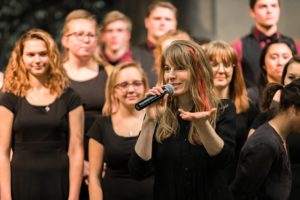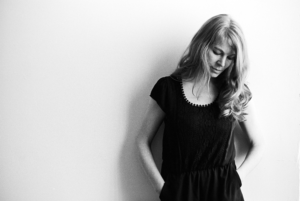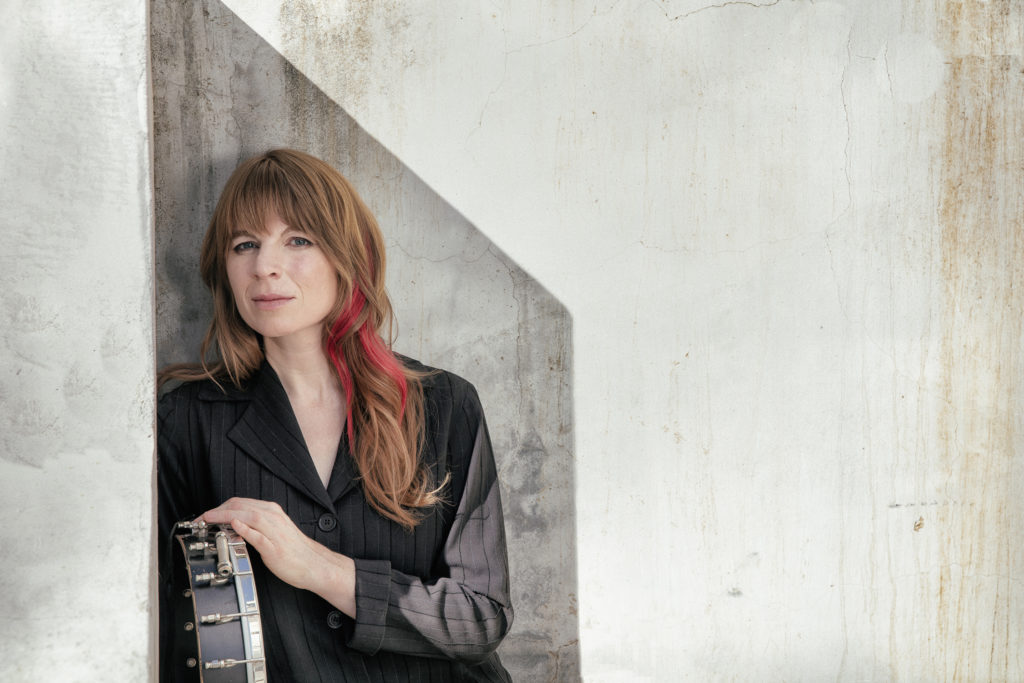Moira Smiley has the soul of a poet, with every bit of conviction, empathy, and outside-the-lines creativity that we artists hope to have on our best days.
She’s a singer, composer, and arranger with a dazzling resume. She’s sung with many of the greats—Ladysmith Black Mambazo, Tune-Yards, Eric Whitacre, the Los Angeles Master Chorale, and Solas—and her choral arrangements have taken on a life of their own, sung by millions of voices around the world today.
But what stands out to me about Moira is the earnestness of her values. As you’ll read below, she initially had concerns about Braver Angels after submitting her Artist of the Month application, and I was delighted that she didn’t run from these concerns but felt comfortable expressing them. It reinforced for me the value of coming to the table in honesty.
Moira and I chatted about the stories behind her songs, her perspective on apathy, and the key to writing political music that isn’t corny. Follow her journey by subscribing to her mailing list or following her on Instagram. Purchase her songs here (the sheet music is available for purchase, too!) or stream them on Spotify & YouTube.
Background

Alma Cook: Thanks for taking the time to let us get to know you, Moira! I wanted to start by asking: how did you grow into your current musical identity and sound? Take us back to your musical origins.
Moira Smiley: There was an LP collection, a piano teacher, and an occasional folk song gathering. It was the Vermont countryside in the 1980s, and being “good at” music meant working a little less in the enormous organic market-garden, taking care of farm animals and all the things to be done on an idealistic farm. Doing music was as important as listening to it, and when I got a scholarship into a music conservatory to study piano performance, I felt I was truly beginning a journey of self-expression, collaborative learning, and making a living all together.
AC: How idyllic! If that’s how you found your musical legs, how did you find your political ones? Where do you stand today, and do you find that most people around you share your beliefs?
MS: I passed between many “worldviews” in my childhood through school environments and shifting parental belief systems. The overarching philosophy that connected me to people (made me feel trust and belonging despite the unease of a nuanced and confusing world) was a socially conscious, left-leaning, art-enthusiastic community.
I consider myself a progressive with skepticism about its assumptions, so I would be on the “blue” side of the American political spectrum. As I read more deeply about Braver Angels and cofounder David Blankenhorn’s work to promote marriage (first, vehemently anti-gay marriage, then including gay marriage) as the necessary social structure for child-rearing and social organizing, I felt compelled to state my position about that specifically.
I believe in the importance and necessity of being who you are and loving who you love, how you love. I was raised by a patriarchal, pro-marriage father who was reacting to being raised by a lesbian intellectual of a mother in the 1940s, so I have wrestled with this on a very personal level. But I have seen so many exquisite single parent and hybrid parenting situations—both as I was growing up, and now as “aunty” in several friendships. Though I also loved and in many ways respected my father, I now think he had an unresolved emotional loss from his childhood that he wrapped in intellectual clothing. He refused/was unable to accept the validity of the experiences of those around him, and found power and stability in putting others below him. I don’t want to gain my stability from being loyal only to my tribe and an unmovable, unprovable set of doctrines.
I understand apathy. We have 24-hour news cycles shouting at us & asking for our emotions at all times. I understand more than ever why my parents focused on sustainable farming & being civically active on a local level. I have apathy & fear, & still my most alive, most transformative experiences have been when I’m willing to investigate that fear & jump in.
Moira Smiley Tweet
Deep Dive
AC: In some of your songs, particularly “Days of War” and “I Have a Voice,” you sing about the importance of speaking up and participating in the public discourse responsibly. In today’s political climate, what would you say to those who feel apathetic about politics and simply choose not to engage?
MS: I understand apathy. We have 24-hour news cycles shouting at us and asking for our emotions at all times. It’s too much. And it’s not really news. I understand more than ever why my parents focused on sustainable farming and being civically active on a local level. I have apathy and fear, and still my most alive, most transformative experiences have been when I’m willing to investigate that fear and jump in. These songs cheer me on, and I need them.
Specifically, “I Have A Voice” was a multi-faceted phrase for me in the midst of the revelations of #MeToo, the election of ultra-bullies to high offices, and my own bubbling of personal songs I could best imagine singing by myself—at least for a while! I’d say to an apathetic person, “Yup, I struggle with that too. I feel afraid, and there are many days I have nothing clear to contribute. But…freedom comes with responsibility, so I keep trying.”
AC: What’s an issue you’ve changed your mind about in the last 5 years?
MS: I’ve stopped believing that we, as a species, are moving towards more openness and a sense of equity with one another. I’ve been lucky, partly because my idealistic parents created a bubble (albeit an imperfect one) to exist in, feel critical of, leave, and come back to. I actually feel that some of my experiences reflect those of religious communities or other “buck the mainstream” groups who make me nervous today. Now everyone thinks they’re a maverick thinker in a crazy world, but I think so many of us are traumatized human animals who really can’t take all the nuance.
AC: That’s heavy. I’ll admit I’ve got more than a little bit of maverick in me, haha! There are downsides and upsides, but having a contrarian streak has made it easier for me to exist as a red within a very blue artist world. So on that note, here’s something I wonder a lot about: why do you think most artists lean blue?
MS: Most of us are taught from early childhood to love others, to use our young imaginations to find a place among all the living things of the world. I believe that artists are often the ones that feel our environment and experiences acutely, and need imagination to keep our sense of belonging and connection. Artists fight to keep that open channel despite the hurtful and confusing aspects of our world. So we want to include everyone in that right to belong and to feel valued. I think artists feel uncomfortably vulnerable to the brutality of human nature and the mystery of our existence, so we must maintain our imaginations and hearts as protection for our hopes!
‘I Have A Voice’ was a multi-faceted phrase for me in the midst of the revelations of #MeToo, the election of ultra-bullies to high offices, & my own bubbling of personal songs I could best imagine singing by myself—at least for a while!
Moira Smiley Tweet
AC: In some of your more recent works, you’ve produced animated and traditional music videos to accompany songs. To what extent do you believe your music is a visual art?
Quick Takes

AC: Time for quick takes! What’s the secret to writing a song about politics that isn’t cheesy or too on-the-nose?
MS: Keep it very personal, let it arise from a personal experience of transformation—whether that’s watching anger arise and change in yourself, trust surprise you, a feeling of clarity and humility… listen to other artists that create art about world events. Add to the conversation.
AC: Tell me about how you use (& feel about) social media—perhaps both as a musician & as someone who cares about politics.
MS: It used to be more fun! I can still feel grateful for the chance to share my experiences so quickly—to feel that sense of belonging, constant change, etc. I can also feel it chipping away at my deeper work and sense of self outside the buzz of “belonging.” I tend to stay away from Twitter because I get annoyed at the “hot takes” and I’m too earnest for the “takedown” culture.
AC: Can you name any musicians across the aisle? Who are your favorites?
MS: That’s a tough one! I’ve certainly made music with many people with whom I disagree over these 25 years of professional music making. I also like some pretty quirky musicians who I’m sure I’d disagree with about a lot of little things.
In my work as a choral composer, I work with artists of various sociopolitical beliefs and widely varying attempts to describe “the mystery”—what we call “faiths.” In my folk music and community music work, it tends to be with quite progressive people and groups. When I’m in Americana circles (bluegrass especially) and choral music and other “niche” genres that celebrate tradition, the music pulls us together and allows us to avoid conversations with potential disagreements.
AC: Would you ever stop listening to an artist because you disagreed with them?
What's Next?
AC: What’s coming down the pike? Anything new we can expect from you artistically in the coming months?
MS: I am developing a braver solo show! And a lot of composing. I’m working on a new piece re-telling the Greek myth of Narcissus with our social media/devices as the new “pool” we gaze into. Also beginning the creation of an evening-length inclusive liturgy for a 24-voice professional vocal ensemble in Cincinnati, alongside four other commissioned pieces which are to be completed by early 2022.




